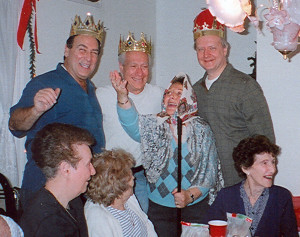ELEVENTH DAY of CHRISTMAS:
Twelfth Night, Eve of the Epiphany
The daylight hours of this Eleventh Day of Christmas offer us another day of preparation, which will be needed, for the setting sun brings us the great festivity of Twelfth Night, a night of eating, drinking, games and music to rival that with which we began at the start of the Christmas season. Christmas deserves as much, no? We rearrange our furniture for Christmas, we bring in a tree, we bake special treats… it’s such a big presence in our lives while it’s with us that it’s only proper to send Old Father Christmas on his way with the festive spirit he deserves.
Twelfth Night and Epiphany center on the Magi and their arrival at Bethlehem to see the child. Tradition tells us that their journey took them across the desert and their arrival was not until the Sixth of January. There are many traditions surrounding Twelfth Night, and as with most things Christmas, they are a mysterious blend of Christian customs and earlier pagan ones. There is, for instance, the tradition of the King of the Bean: a bean is baked into the Twelfth Night cake, and the person who finds it in his plate is crowned King of the Bean, and he becomes the Lord of the Feast for Twelfth Night, leading the company in games and song. In Italy, the bean is a fava bean. In France, there often is not just a bean but also a pea, and the person who finds the pea is the queen. These are traditions that go back directly to the ancient Roman solstice celebration of Saturnalia, where the very same thing was done. To think that people have been performing this same ritual at this dark time of year for so many centuries is, to me, fascinating.
In Italy, this Eve of the Epiphany is the night of la befana. The legend tells us that at that first Christmas oh so long ago, the Magi stopped at la befana’s house and asked her to join them on their journey, but she turned them down, for she had too much housework to do, and so they went on their way. But la befana had a change of heart as she swept the floors, and once she was done sweeping, she set out to find the Magi. But she never did find them, nor the child… and to this day, on each Twelfth Night, she sets out upon her broom to seek them.
La befana is also one of the last of the Yuletide gift bearers, for as she makes her way across the country, she delivers small presents to the children. For those that were not so good, she might leave a lump of coal, but even that is not so bad, because la befana’s coal is sweet as sugar.
Epiphany on the 6th of January is still a major day for gift-giving in Italy (as well as in Latin America, where the festival of los Tres Reyes, the Three Kings, is celebrated… and they also are gift-bearers). If la befana riding the night on her broom sounds a bit like a witch to you, that would be a fairly accurate description, and so here again we have a bit of paganness, in la befana as a personification of the pagan earth goddess as the wise old hag, giving way to the child, just as the old year passes into the new. Her name, befana, is thought to be a corruption of the Italian name for Epiphany: Epifania.
At this time of year my cousins in New York and New England gather together for a Christmastime dinner and la befana always comes to pay a visit. It’s often my cousin Cammie that plays the part. For us here in Lake Worth, Twelfth Night will be a night for a sparkling Christmas punch and a festive dinner with family. It’s usually something grand and this year it’s something we’ve never made before: a standing rib roast. Usually there are small presents to exchange in a game we call Yankee Swap, but this year, it’ll be more like a second Christmas, as my nephew and his family from the Gulf Coast come to spend Twelfth Night with us, and so the gifts given this night will be more in the spirit of the gifts the Magi brought to Bethlehem.
La befana, meanwhile, will begin the process of sweeping away the Christmas festivities for one more year. By the time she’s done with her sweeping tomorrow, Christmas will be done.
Image: My cousin Marietta was kind enough to send me this photo of a recent Cutrone cousins party, which takes place around Twelfth Night every year. That’s my cousin Cammie as la befana, backed up by our own three kings.

